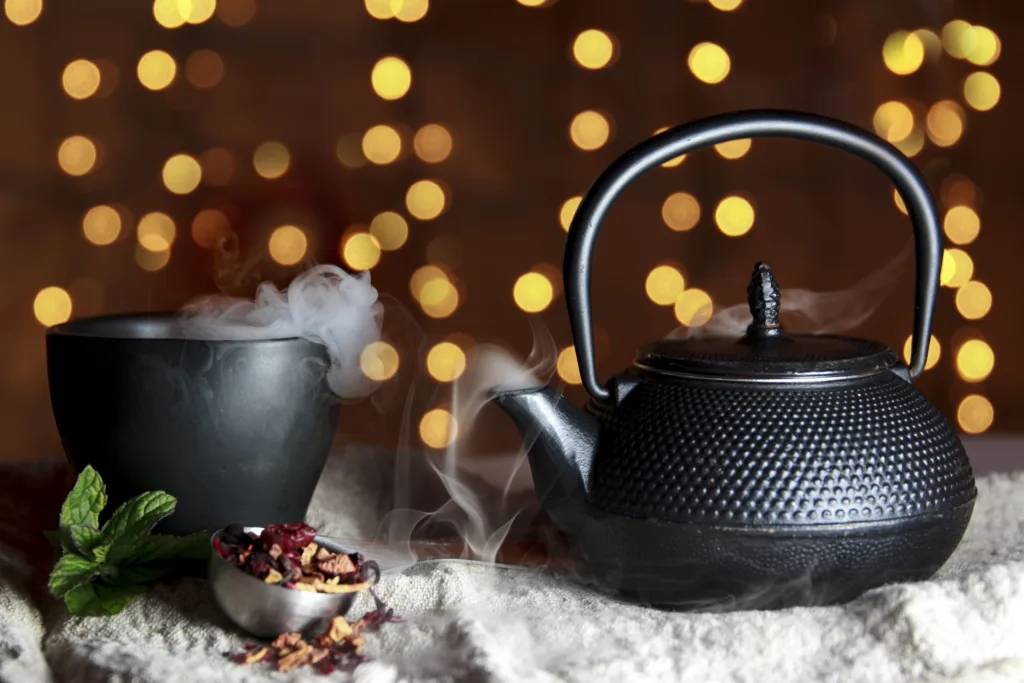Are you looking for a low FODMAP drink that can give you the same benefits as coffee without triggering your digestive issues? Look no further than black tea! Low in fructans and lactose, it is a great alternative for those with IBS or other digestive sensitivities. In this article, we will explore the benefits of black tea, its low FODMAP status, and how to make the perfect cup. With this information, you can easily enjoy black tea without aggravating your digestive system. So keep reading to learn all about black tea and its low FODMAP status!
The Low FODMAP Diet is a dietary approach designed to reduce the amount of certain carbohydrates (Fermentable Oligosaccharides, Disaccharides, Monosaccharides, and Polyols) that can trigger symptoms in individuals with conditions such as irritable bowel syndrome (IBS). The Low FODMAP Diet involves avoiding high-FODMAP foods and substituting them with low-FODMAP alternatives.
Black Tea
Black tea is a type of tea that is more oxidized than oolong, green, and white teas. It is generally stronger in flavor than the less oxidized teas. Black tea has a strong aroma and typically a bitter taste. When brewed properly, it can have a rich, full-bodied flavor and a deep amber color. Most black teas are blended with other ingredients to give them a unique flavor profile. Popular varieties of black tea include Assam, Darjeeling, Earl Grey, Lapsang Souchong, and English Breakfast. Black tea can be enjoyed either hot or cold and is often served with honey or milk. It can also be used to make iced tea or as an ingredient in recipes such as muffins and cakes.
Is Black Tea Low FODMAP?
Black tea is a popular beverage, but can be problematic for those following a low FODMAP diet. Generally speaking, black tea is considered to be low FODMAP because it does not contain fructose-containing sugars or other FODMAPs. However, some people may still experience digestive issues after drinking it due to additional compounds present in the tea. These compounds include caffeine, which can cause digestive discomfort in some individuals. Additionally, black tea contains tannins that can trigger symptoms of irritable bowel syndrome (IBS) in some people.
It is important to note that everyone’s tolerance for different foods and beverages will vary, so it is best to monitor your own reaction when consuming black tea. If you find that you are experiencing any negative symptoms after drinking black tea, then it might be best to avoid it or limit your intake. Additionally, if you are sensitive to caffeine then it may be best to opt for decaffeinated varieties of black tea instead.
Click here to preview your posts with PRO themes ››
Overall, black tea is considered to be low FODMAP and can be enjoyed by those following a low FODMAP diet. However, the key is to monitor your own reaction and always listen to your body when determining which foods and beverages are right for you.
Definition of Low FODMAP Diet
A Low FODMAP Diet is a type of elimination diet that restricts the intake of certain carbohydrates which are known as fermentable oligosaccharides, disaccharides, monosaccharides and polyols (FODMAPs). The goal of this diet is to reduce symptoms in people with irritable bowel syndrome (IBS) and other digestive issues. It has been found to be effective in reducing abdominal pain, bloating, and other common IBS symptoms.
Foods to Avoid on a Low FODMAP Diet
On a Low FODMAP Diet, certain high-FODMAP foods should be avoided. These include wheat, onion, garlic, legumes, apples, pears, and certain dairy products. Other foods that contain higher levels of FODMAPs include honey, certain vegetables (such as mushrooms and cauliflower), certain fruits (such as mangoes and bananas), and artificial sweeteners.
Benefits of Low FODMAP Diet
The benefits of the Low FODMAP Diet are numerous. For those with IBS and other digestive issues, following the diet can significantly reduce symptoms such as abdominal pain and bloating. Additionally, it can help improve nutrient absorption by reducing the amount of fermentable carbohydrates in the gut. Following a low FODMAP diet can also help reduce inflammation throughout the body by decreasing the production of inflammatory compounds in the gut. Finally, it can help improve overall gastrointestinal health by promoting beneficial bacteria growth in the gut microbiome.
Possible Side Effects of Low FODMAP Diet
Following a Low FODMAP diet can be beneficial in reducing symptoms of irritable bowel syndrome (IBS), but it is important to be aware of potential side effects. Some people may experience certain side effects while following a Low FODMAP diet, such as an unbalanced nutrient intake, difficulty with social situations, and an increased risk for disordered eating.
An unbalanced nutrient intake is one of the possible side effects of following a Low FODMAP diet. The diet eliminates many foods that are high in certain essential nutrients, such as fiber, calcium, and iron. It is important to make sure these nutrients are replaced with other sources. Vitamin and mineral supplements may be necessary if dietary changes cannot provide the needed nutrients.
Social situations can also be difficult for those following a Low FODMAP diet since many social events revolve around food. People on the diet may need to plan ahead or suggest alternate activities in order to avoid potentially triggering foods. Additionally, it can be hard to find restaurants that offer Low FODMAP meals or accommodate special requests.
Click here to preview your posts with PRO themes ››
Finally, there is an increased risk for disordered eating among people who follow a Low FODMAP diet due to its restrictive nature. People on the diet should strive to maintain a healthy relationship with food and not focus solely on eliminating trigger foods. It is important to seek help if disordered eating behaviors begin to develop or intensify while following the Low FODMAP diet.

How to Incorporate Black Tea into Low FODMAP Diet
Black tea is a great beverage for those following a Low FODMAP diet. It is low in FODMAPs, making it a great choice for people who are trying to reduce their intake of these compounds. Additionally, black tea is packed with antioxidants and other beneficial compounds that can help protect against disease and promote overall health. Here are some tips for incorporating black tea into your Low FODMAP diet:
The first step is to choose the right type of black tea. There are many varieties, including green, oolong, white, and herbal teas. When selecting a tea, be sure to look for one that is labeled “Low FODMAP” or “FODMAP Friendly”. This will ensure that the tea contains only low amounts of FODMAPs.
Next, consider how you will prepare your black tea. The traditional method involves steeping the leaves in hot water for several minutes and then straining off the liquid before drinking. This method can help reduce the amount of FODMAPs present in the tea. Alternatively, you can purchase pre-packaged tea bags that contain only low amounts of FODMAPs.
Finally, consider adding other ingredients to enhance the flavor of your black tea. Some good options include lemon or lime juice, honey, ginger root slices, cinnamon sticks, or fresh mint leaves. All of these ingredients are low in FODMAPs and can add flavor without increasing your intake of these compounds.
By following these simple tips, you can easily incorporate black tea into your Low FODMAP diet and enjoy its many health benefits!
What Substitutes for Black Tea on a Low FODMAP Diet?
For those following a Low FODMAP diet, black tea is often off the menu. Thankfully, there are plenty of delicious and nutritious alternatives that can make for a satisfying cup of tea. Herbal teas such as peppermint, rooibos, chamomile, and ginger are all low in FODMAPs and are particularly beneficial for soothing an upset stomach. Other options include green tea, which can also be enjoyed without any adverse effects. For those who prefer a more traditional taste, black tea blends such as earl grey and English breakfast can also be enjoyed without triggering digestive symptoms.
Click here to preview your posts with PRO themes ››
Finally, if you’re looking for something truly unique, consider giving herbal adaptogen teas a try. Adaptogens are herbs that are believed to help the body respond to stressors in a healthy way and can be found in many different types of teas. Some popular adaptogen-infused teas include turmeric with ginger and ashwagandha with honeybush.
Following a Low FODMAP Diet with Black Tea
The low FODMAP diet is an elimination diet that has been designed to help people who suffer from digestive problems such as irritable bowel syndrome (IBS). It involves avoiding foods that contain certain types of carbohydrates, known as FODMAPs, which can be difficult for the body to digest. Black tea is one of the beverages that may be consumed on this diet. However, there are some guidelines that should be followed when drinking black tea on a low FODMAP diet.
The first step is to choose a black tea that does not contain any added ingredients such as sweeteners or flavorings. These can contain FODMAPs and should be avoided. It is also important to check the labels of any store-bought teas for ingredients that may contain FODMAPs.
It is also important to consider how much black tea you are drinking each day. The recommended amount on the low FODMAP diet is two cups per day, and it is best not to exceed this amount. Additionally, it may be helpful to drink the tea between meals rather than with food, as this can help reduce the risk of gastro-intestinal symptoms.
Finally, it is important to limit your intake of caffeine from other sources if you are following a low FODMAP diet and drinking black tea. Caffeine can cause digestive symptoms in some people, so it is best to keep your intake within recommended limits. If you are having any issues with caffeine consumption, it may be best to switch to decaffeinated black tea instead.
By following these guidelines and being mindful of your dietary choices while following a low FODMAP diet, you can still enjoy a cup of black tea without compromising your health or increasing your risk for gastrointestinal symptoms.

Conclusion
Black tea is generally low FODMAP and can be enjoyed without fear of triggering IBS symptoms in most people. It is important to note, however, that some people may still experience adverse reactions to black tea due to its caffeine content or other individual sensitivities. If you are unsure if you can tolerate black tea, it may be wise to speak with your doctor or nutritionist first.
Although high-quality black teas such as Darjeeling, Assam and Nilgiri are usually safe for those with IBS, it may be best to avoid flavored teas as they often contain added sugars and other sweeteners which may cause digestive discomfort.
Overall, black tea can be a great beverage option for those with IBS who want to enjoy a delicious hot drink without symptoms. However, it is always important to keep an eye on your individual tolerance levels and seek professional advice if needed.

